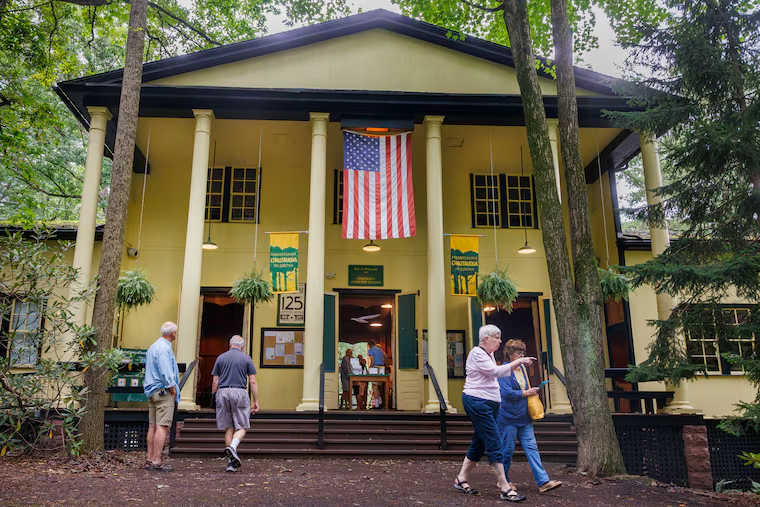This rural Pennsylvania utopia is like a spa for the mind
Mount Gretna, the "Pennsylvania Chautauqua," is one of 17 remaining communities inspired by the Victorian-era Chautauqua movement dedicated to arts, religion, recreation, and education.

MOUNT GRETNA, Pa. — Sunlight filtered through the tall oaks and pines, dancing on the hardwood floors in the Hall of Philosophy. A few dozen people sat in wooden rocking chairs, some taking notes, while a college professor waxed about democracy and polarization in modern America.
It wasn’t your typical Tuesday morning in rural Pennsylvania.
This Lebanon County community, a little over 80 miles west of Philadelphia, sits in a valley surrounded by forest and state game lands, and its hilly streets are lined with quaint Victorian homes, large and small, blooming with art and flowers and shaded by towering trees. Mount Gretna isn’t just a town of pretty houses where most people walk, though. It’s the only municipality in Pennsylvania that’s part of the late 19th-century Chautauqua movement dedicated to the “exploration of the best in human values and the enrichment of life.”
“This is like nirvana,” resident Gretchen Housner said while pruning elephant ear plants and begonias.
Others called Mount Gretna “paradise,” and at least one person The Inquirer spoke to called it a “utopia.”
The first Chautauqua community was founded along the shores of Chautauqua Lake in Western New York in 1874 by two Methodists. According to the Chautauqua Institution’s website, Chautauqua was an “educational experiment in out-of-school, vacation learning” for adults. That evolved into a summer living community with theaters, live music, nature trails, religion, art lessons, etc.
“It truly sparked a movement,” said Emily Morris, the institution’s senior vice president.
Some 250 Chautauqua communities sprouted up in the United States and Canada in the ensuing decades, most of them in rural areas, Morris said. President Teddy Roosevelt once called Chautauquas “the most American thing in America.” Some historians said the advent of American car culture and advances in entertainment, like radio and motion pictures, brought those numbers back down.
Today, 17 communities remain on the Chautauqua Trail in North America, including the Ocean Grove Assembly in Monmouth County, N.J., and Mount Gretna. On this Tuesday morning, after the book discussion in Mount Gretna’s Hall of Philosophy, resident Stinson Stroup, 75, stepped onto the porch with a slew of options left to fill his week: poetry classes, birding walks, a student film festival, live music, more lectures, and a coming arts festival that would swell the small town of just 717 residents.
“It’s very different for me now, in the summer, because I no longer work and can attend a lot more of the programs,” Stroup said. “There’s something every single day.”
The Chautauqua Summer Programs committee plans the events, often drawing from local colleges for lecturers. All of the summer programs are free to the public, though donations are recommended.
Sue Hostetter, a resident and president of Mount Gretna’s historical society, led The Inquirer on a leisurely walk up the gravel paths that run between houses. Jazz guitar notes floated out from the playhouse as a sound technician worked from his booth, just feet from some of the cottages. Most of the homes have deep front porches, filled with chairs and loungers. Some of the homes have names, like the “Owl’s Nest” and “Almost Heaven.” Other homes have QR codes posted outside that reveal their historic significance.
“We have an embarrassment of riches when it comes to arts and culture,” Hostetter said.
Some landscaping equipment and delivery trucks could be heard in the distance, but Mount Gretna has strict and exhaustive noise ordinances that include anything “loud, unnecessary, or unusual” during certain hours of the day.
“No leaf blowers after 5 p.m.,” she said.
There are also ordinances about cutting down trees, and, in an effort to maintain the integrity and aesthetics of the classic Chautauqua vibe, only 10% of the homes are permitted to have short-term rentals. The rest go on a waiting list.
“We could become an Ocean City, N.J.” Hostetter said.
The Mount Gretna rentals available on Airbnb include a three-bedroom home with a massive porch built in 1902, a two-bedroom cottage with floor-to-ceiling stained glass in the kitchen, and a lakefront cabin with a hot tub built in 1925.
Mount Gretna homes, along with some smaller homes in the adjacent Camp Meeting section, do hit the market from time to time, with prices ranging anywhere from $150,000 to $600,000, according to past Zillow sales. While Mount Gretna residents tend to be older, Hostetter said, younger families are moving in.
There are no hotels or campgrounds in Mount Gretna and street parking is limited to residents, but its ice cream shop, built in 1895, is open to the public, along with its lake and beach, for a fee. Mount Gretna also has a visitor center, along with occasional house tours.
“It can be exclusive because it’s not that easy to buy a house here,” she added.
The original Chautauqua, in New York, has a 150-room hotel.
“We’ve found the hotel is typically the most common place for a first-time visit,” Morris said.
Chautauquas, Morris said, are still grounded on four pillars — arts, education, religion, and recreation — but they’re open to all faiths.
“Our people are like the Jack Russell terriers of vacationers,” she said. “They get up and they’re active in mind, body, and spirit, every single minute, of every single day.”